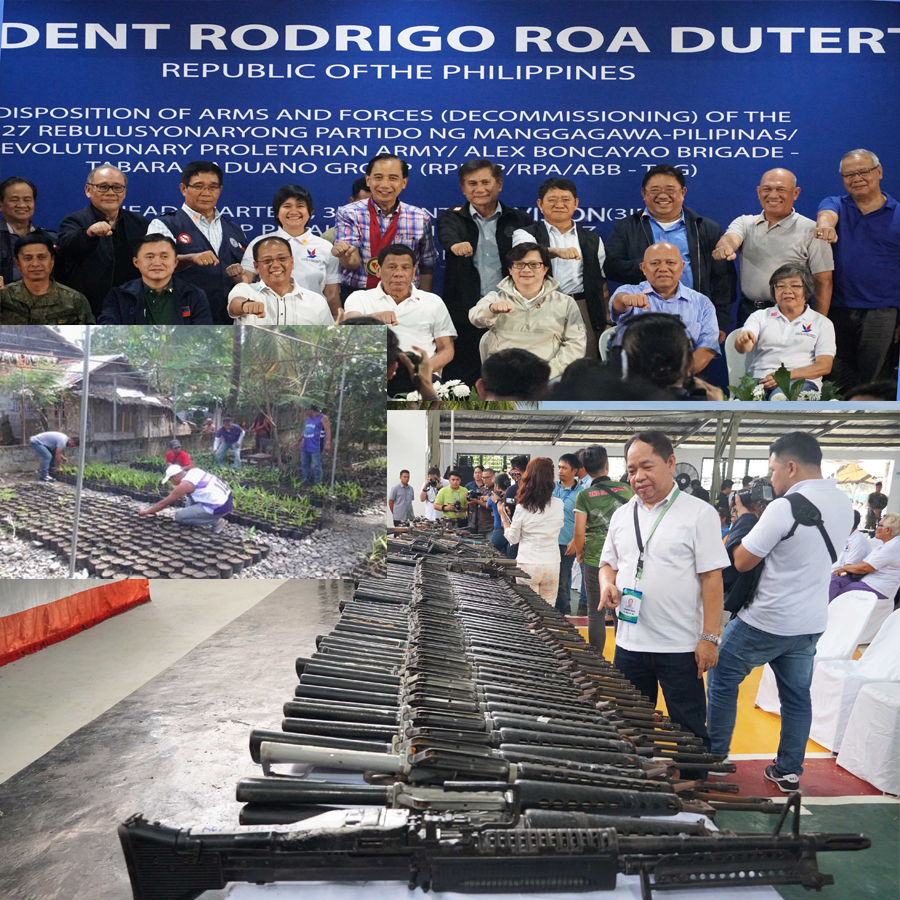DENR’s refo program pushes forpeace and development


TRANSFORMATION. Former rebel combatants of RPA-ABB-TPG turned into forest managers and are engaged in tree seedlings production activities in the province of Aklan (inset photo); President Rodrigo Roa Duterte led the decommissioning of the more than 300 firearmssurrendered by the former rebels on September 19, 2019 at the 3ID, PA, Camp Peralta, Jamindan, Capiz (above photo); DENR 6 RED Francisco E. Milla looks at the surrendered firearms prior to the start of the program at Camp Peralta (bottom photo).
The recent decommissioning of firearms of former combatants of the Rebolusyonaryong Partido ng Manggagawa ng Pilipinas/Revolutionary Proletarian Army/Alex Boncayao Brigade–Tabara-Paduano Group (RPM-P/RPA/ABB-TPG) was a long, tedious work and a collaboration of efforts from different national government agencies.
As former rebel combatants, they were always on the run for their lives. But finally they got tired, and had a peace talk with the government. The Office of the Presidential Adviser on Peace Process (OPAPP) listened to the plea and had embraced them through the PAMANA Program. An acronym for PAyapa at MAsaganang PamayaNAn, PAMANA began in 2012 with eleven national government agenciesimplementing the program.
One of the elevenis the Department of Environment and Natural Resources (DENR) who had made socio-economic interventions in pursuing the peace process with the former rebel combatants of the RPM-P/RPA/ABB/TPG.
Here in Western Visayas, the DENR implemented PAMANA program by hiring members of the former rebel combatants to work as Forest Guards (FGs) in reforestation project specifically in National Greening Program (NGP) sites. The DENR 6 worked real hard to grant them their Peace and Development Communities (PDC) sites and provided sustainable livelihood in contracting them under the NGP.
From being society’s menace, they become some of the most productive citizens of this country. How did that happen?
As DENR–PAMANA beneficiaries in the province of Antique province, twenty two (22) of them were hired and worked as staunch forest guards, whose presence had proved to be a strong deterrence to illegal tree cutters in the towns of Culasi and Belison. Their presence thereby helped protect and conserve the province’s natural resources.
Since becoming beneficiaries in 2014in Aklan province, the group had produced a total of 390,390 seedlings. The group, now known as Kapatiran para sa Progresibong Panlipunan, Inc. as part of their institutional transformation, had signed a total contract cost worth Php 6,214,970.00 since 2014 up to the present. They maintain plantation in three upland sites namely: in Ibajay, Tangalan and Nabas, and has planted commodities ranging from timber and indigenous tree species to agroforestry and high value crops.
A total of 57.51 hectares of land situated in the town of Ibajay now served as their PDC site or settlement area. It was made possible through the tenurial instrument called Community-Based Forest Management Agreement (CBFMA) which was awarded to them on April 25, 2018. The CBFMA is an agreement between DENR and Kapatiran which allows them to develop, utilize, manage and conserve a specific portion of the forestland consistent with the principles of sustainable development.
In Negros Occidental, they were granted their settlement areas which are also covered by the CBFMA and are located in Kabankalan City with an area of 179.64 hectare (ha.) and with 80 beneficiaries; Cadiz City, 232 ha., with 73 beneficiaries; and San Carlos City, 230 ha. with 180 beneficiaries. Last November 2018, the Negros group was able to produce 112,000 seedlings and continued maintaining and protecting 225 hectares of forestlands. Under the PAMANA–NGP, they were able to establish plantations with a total of 540 hectares in the hinterlands of Cadiz and Kabankalan. They are also instrumental in assisting DENR forest rangers in their LAWIN foot patrol and in law enforcement activities.
After years of returning to the fold of the law, their efforts are paying off. The decommissioning of their more than 300 firearms last September 19, 2019 at the 3ID, Camp Peralta in Jamindan, Capiz was a step closer to the completion of the peace pact. As the struggle continues, the DENR and all other national government agencies will continue to work for these former rebels to attain the peace and development they too deserve – for them and their families.
“With your PDC sites, we will help you build your community. Now you can live in peace among one another and start your economic activities. We wanted you to pursue sustainable development while we also ensure your safety,” said Environment Secretary Roy A. Cimatu, who is also the Cabinet Officer for Regional Development and Security (CORDS) for Western Visayas.
- Details
- Parent Category: News & Events
- Category: Press Releases




